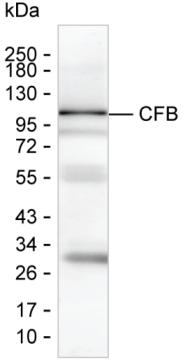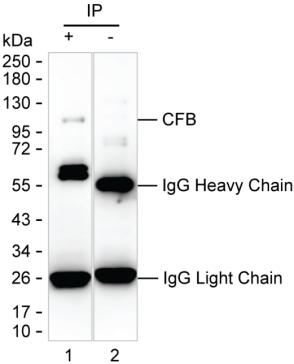

| WB | 咨询技术 | Human,Mouse,Rat |
| IF | 咨询技术 | Human,Mouse,Rat |
| IHC | 1/100-1/300 | Human,Mouse,Rat |
| ICC | 技术咨询 | Human,Mouse,Rat |
| FCM | 咨询技术 | Human,Mouse,Rat |
| Elisa | 1/5000-1/10000 | Human,Mouse,Rat |
| Host/Isotype | Mouse IgG2b |
| Antibody Type | Primary antibody |
| Storage | Store at 4°C short term. Aliquot and store at -20°C long term. Avoid freeze/thaw cycles. |
| Species Reactivity | Human |
| Immunogen | Purified recombinant fragment of human CFB |
| Formulation | Purified antibody in PBS with 0.05% sodium azide |
+ +
以下是关于TRADD抗体的3篇参考文献及其摘要概括:
---
1. **文献名称**: "The TNF Receptor 1-Associated Protein TRADD Signals Cell Death and NF-κB Activation"
**作者**: Hsu, H., Xiong, J., & Goeddel, D.V.
**摘要**: 该研究首次鉴定了TRADD蛋白,证明其通过结合TNFR1的死亡结构域介导细胞凋亡和NF-κB活化。实验中利用TRADD抗体进行免疫共沉淀,揭示了其在信号转导复合物中的核心作用。
---
2. **文献名称**: "Induction of TNF Receptor I-Mediated Apoptosis via Two Sequential Signaling Complexes"
**作者**: Micheau, O., & Tschopp, J.
**摘要**: 研究提出TNFR1通过两个连续的复合物(质膜上的促存活复合物和胞内的促凋亡复合物)调控细胞命运。通过TRADD抗体分析发现,TRADD在早期复合物中招募RIP1和TRAF2.而在后期复合物中与FADD结合驱动凋亡。
---
3. **文献名称**: "Function of TRADD in Tumor Necrosis Factor Receptor 1 Signaling and in TRIF-Dependent Inflammatory Responses"
**作者**: Ermolaeva, M.A., et al.
**摘要**: 利用TRADD基因敲除模型及抗体检测,揭示了TRADD不仅参与TNFR1介导的凋亡和炎症反应,还通过结合TRIF(Toll/IL-1R适配体)调控TLR3/4信号通路,拓展了其在天然免疫中的功能。
---
4. **文献名称**: "TRADD protein is an essential component of the RIG-like helicase antiviral pathway"
**作者**: Pobezinskaya, Y.L., et al.
**摘要**: 该研究通过TRADD抗体敲低实验,证明TRADD在RIG-I样受体(RLR)抗病毒通路中不可或缺,其通过衔接MAVS蛋白促进I型干扰素产生,揭示了TRADD在抗病毒免疫中的新机制。
---
以上文献均涉及TRADD抗体的应用,涵盖其在凋亡、炎症及免疫信号中的功能研究。
The TRADD (TNF Receptor-Associated Death Domain) antibody is a critical tool in studying signaling pathways linked to tumor necrosis factor receptor 1 (TNFR1). TRADD is an adaptor protein that plays a dual role in mediating both cell survival and apoptosis. Upon TNF binding to TNFR1. TRADD recruits downstream signaling molecules, such as TRAF2. RIPK1. and FADD, forming complexes that activate either the NF-κB pathway (promoting inflammation and survival) or the caspase cascade (triggering apoptosis). This balance is vital for immune regulation, tissue homeostasis, and disease progression.
TRADD antibodies are widely used in research to detect TRADD expression, localization, and interactions in experimental models. They enable techniques like Western blotting, immunofluorescence, co-immunoprecipitation, and immunohistochemistry, helping elucidate TRADD's role in diseases like cancer, autoimmune disorders, and neurodegenerative conditions. For instance, dysregulated TRADD signaling has been implicated in resistance to apoptosis in tumors or excessive inflammation in autoimmune diseases.
These antibodies are essential for validating TRADD knockout/knockdown models and screening therapeutic agents targeting TNF pathways. Specificity and validation (e.g., species reactivity, application compatibility) are critical considerations. By probing TRADD's functions, researchers aim to uncover mechanisms underlying cell fate decisions and develop targeted therapies modulating TNFR1 signaling.
×